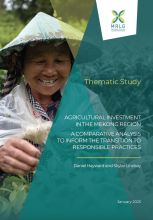Land Library
Welcome to the Land Portal Library. Explore our vast collection of open-access resources (over 74,000) including reports, journal articles, research papers, peer-reviewed publications, legal documents, videos and much more.
/ library resources
Showing items 1 through 9 of 2530.Climatewash: The World Bank’s Fresh Offensive on Land Rights reveals how the Bank is appropriating climate commitments made at the Conference of the Parties (COP) to justify its multibillion-dollar initiative to “formalize” land tenure across the Global South.
The Palladium research team visited Jordan in October 2019, and hosted roundtables in Amman and the Netherlands to collect and validate the collected information.
This analysis examines agricultural investment in the Mekong region, focusing on Cambodia, Laos, and Vietnam, to promote Responsible Agricultural Investment (RAI).
The Mekong Region has experienced rapid agrarian change over the past two decades, driven by public sector policies promoting agricultural commercialisation to alleviate rural poverty, provide income opportunities, and modernize agricultural production systems.
Los sistemas alimentarios y las estructuras agrarias han cambiado mucho a nivel global en las últimas décadas, con lo que han creado o reforzado algunas tendencias en el agro.
This brochure provides an overview of the Global Programme Responsible Land Policy (GPRLP) implemented by the German Development Cooperation Gesellschaft für Internationale Zusammenarbeit (GIZ).
Sud-Cameroun Hévéa (“SudCam”), a giant monoculture rubber plantation and a Cameroonian subsidiary base of Halcyon Agri Corporation Limited (“Halcyon Agri”) has come under intense scrutiny and criticism due to the severe human rights violations and threats to biodiversity inflicted upon the surrou
The starting point for the Conference and Summit was the recognition that ongoing transitions in the name of climate change and clean energy are deeply unfair in multiple ways.
Ce cahier fait la synthèse des dynamiques du foncier rural en Algérie depuis les années 1960. Il analyse en trois temps le processus de transition qui a conduit le pays de l’autogestion à la concession des terres observé au cours de ces cinquante dernières années.







